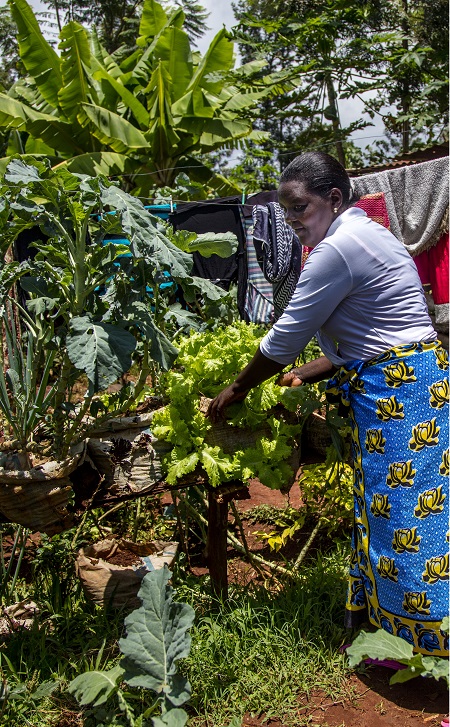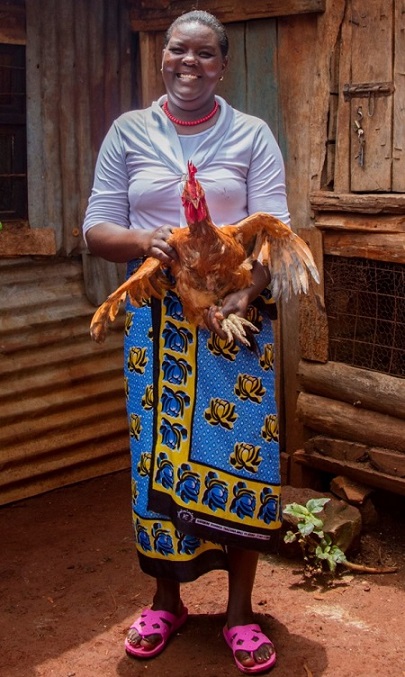
Meet Cecily, whose vertical farm has taken flight
Fifteen square meters isn’t just the size of Cecily Wawira’s rented smallholder farm. For years, it was the boundary imposed on her ambitions. But after learning an innovative growing technique called ‘vertical farming’ from a Hand in Hand Self-Help Group – along with the basics of entrepreneurship – things are looking, well, up.
“Many people here are down economically,” says the 44-year-old grandmother from Embu County, Kenya. “If they can be empowered and lifted up the same way we have, they too can become active and do things the way we are doing them now.”
Embu County, Kenya
Making ends meet
Life is changing rapidly in urbanising Embu County, home to more than 500,000 people. According to the Kenya National Bureau of Statistics, 28.2 percent of residents live below the poverty line, which the World Bank classifies as earning less than US $1.90 a day.
For those still working as smallholder farmers, life can especially hard. Problems affecting farming in this arid region range from an unpredictable climate and scarcity of water to, for thousands like Cecily, a simple lack of land.
Maximising growth
For much of her life, Cecily was a casual labourer who struggled to make enough money to purchase even basic necessities.
She rarely made more than KES 250 (US $2.50), which made it difficult for her and her husband to provide not only for themselves, but also for their two children.
“If I wanted to eat an egg or vegetables or meat, I went asking for a loan in the shop,” Cecily said.
Her fortunes changed early last year, when she learned about the Mathayo Women Self-Help Group.
With generous support from the IKEA Foundation, Hand in Hand trainers led regular morning meetings in which the women were taught the fundamentals of running their own business.
“I listened to them and I heard they had good things to say, such as the importance of having savings to improve my life and how I will benefit,” Cecily said.
That rekindled her interest in farming, but because of a lack of land, she had to be creative. With the support of the Self-Help Group, Cecily learned how to set up a vertical farm – a series of outdoor shelves holding bags of soil where vegetables grow – to maximise her limited space.

“Because here land is small, I see it’s important to plant that way,” Cecily said. “Now I benefit by eating the vegetables – spinach, kale and amaranth – and there are others I sell.”
Spreading her wings

IKEA Foundation projects Embu run by Hand in Hand East Africa.
Cecily’s calculations were correct. She was soon able to sell her vegetables, keeping some of the profit as an income and reinvesting the rest. She then began retailing bananas, which she sold for a weekly profit of KES 2,000 (US $20).
Within time, the profits from the vegetable farm and the bananas helped her dream grow bigger. Now, Cecily raises chickens and sells eggs for KES 25 (US $0.25) each. She even uses the manure as a fertiliser for the soil in which she grows the vegetables.
“The biggest difference is that I am very busy doing a lot of things and I am making good money,” she said.
Each day, Cecily aims to put aside a portion of her profit for her savings. She has been able to help her children, aged 24 and 22 with children of their own, to support their families. She has also noticed her neighbours have set up their own vertical farms.
And, with the money she has earned from her growing business, she and her husband have a new financial goal.
“Eventually I want to build my own house so I can improve my life,” Cecily said.
Cecily’s results
Set up her own farming business
Reinvested profits in order to expand
Set goal to one day own home and land
Next case study: Meet Gloria, the former refugee growing crops – and profits
